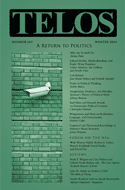Dimitris Gakis’s “Wittgenstein and Marx on Reification, Language, and Commonality” appears in Telos 169 (Winter 2014). Read the full version online at the Telos Online website, or purchase a print copy of the issue in our store.
 The article is primarily occupied with some of the affinities that can be discerned between the philosophical outlooks of (later) Wittgenstein and Marx. Starting from a short account of the connections that can be drawn between Wittgenstein and Marx from a historico-biographical and a metaphilosophical point of view, we focus then on three main points on which their philosophical perspectives converge. The first one has to do with Marx’s concept of reification and Wittgenstein’s deep criticism against those approaches to language and meaning that exhibit reificatory characteristics. The second one is related, first, to their common conception of language as a matter of social praxis and their shared rejection of the idea of a private language and, second, to their common prioritization of everyday language over what they often call metaphysical or philosophical language which they take to be a distorted and deceiving form of everyday language. The third and last point regards the shared emphasis of Wittgenstein and Marx on the notion of the “common” and on the communal aspects of human life and praxis. The article concludes with a reference to some of Wittgenstein’s criticisms against certain aspects of Marxist thought, such as scientism, determinism, and economism, and a brief discussion of how Wittgenstein’s later philosophy may be viewed as a (potentially) significant contribution to the cause of personal and social autonomy.
The article is primarily occupied with some of the affinities that can be discerned between the philosophical outlooks of (later) Wittgenstein and Marx. Starting from a short account of the connections that can be drawn between Wittgenstein and Marx from a historico-biographical and a metaphilosophical point of view, we focus then on three main points on which their philosophical perspectives converge. The first one has to do with Marx’s concept of reification and Wittgenstein’s deep criticism against those approaches to language and meaning that exhibit reificatory characteristics. The second one is related, first, to their common conception of language as a matter of social praxis and their shared rejection of the idea of a private language and, second, to their common prioritization of everyday language over what they often call metaphysical or philosophical language which they take to be a distorted and deceiving form of everyday language. The third and last point regards the shared emphasis of Wittgenstein and Marx on the notion of the “common” and on the communal aspects of human life and praxis. The article concludes with a reference to some of Wittgenstein’s criticisms against certain aspects of Marxist thought, such as scientism, determinism, and economism, and a brief discussion of how Wittgenstein’s later philosophy may be viewed as a (potentially) significant contribution to the cause of personal and social autonomy.


